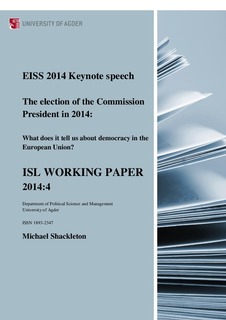| dc.contributor.author | Shackleton, Michael | |
| dc.date.accessioned | 2014-09-30T10:14:40Z | |
| dc.date.available | 2014-09-30T10:14:40Z | |
| dc.date.issued | 2014 | |
| dc.identifier.issn | 1893-2347 | |
| dc.identifier.uri | http://hdl.handle.net/11250/222238 | |
| dc.description | Presentation on department page: http://www.uia.no/no/portaler/om_universitetet/oekonomi_og_samfunnsvitenskap/statsvitenskap_og_ledelsesfag/ forskning_isl/isl_working_papers_series | nb_NO |
| dc.description.abstract | On 15 July 2014 the European Parliament elected Jean Claude Juncker, the former Prime Minister of Luxembourg, as the next President of the European Commission. It was the final act in a process which had proved more controversial than the appointment of any of Juncker’s predecessors. His nomination as a candidate on 27 June by the Heads of State and Government in the European Council was only agreed after two countries, Hungary and the United Kingdom, openly voiced their opposition and explicitly requested a vote. Never had the European Council taken such an important decision by majority vote, rather than seeking a consensus acceptable to all. | nb_NO |
| dc.language.iso | eng | nb_NO |
| dc.publisher | Department of Political Science and Management, University of Agder | nb_NO |
| dc.relation.ispartofseries | ISL Working Papers; | |
| dc.subject | Political Science | nb_NO |
| dc.title | EISS 2014 Keynote speech: The election of the Commission President in 2014: What does it tell us about democracy in the European Union? | nb_NO |
| dc.type | Working paper | nb_NO |
| dc.source.pagenumber | 13 | nb_NO |
